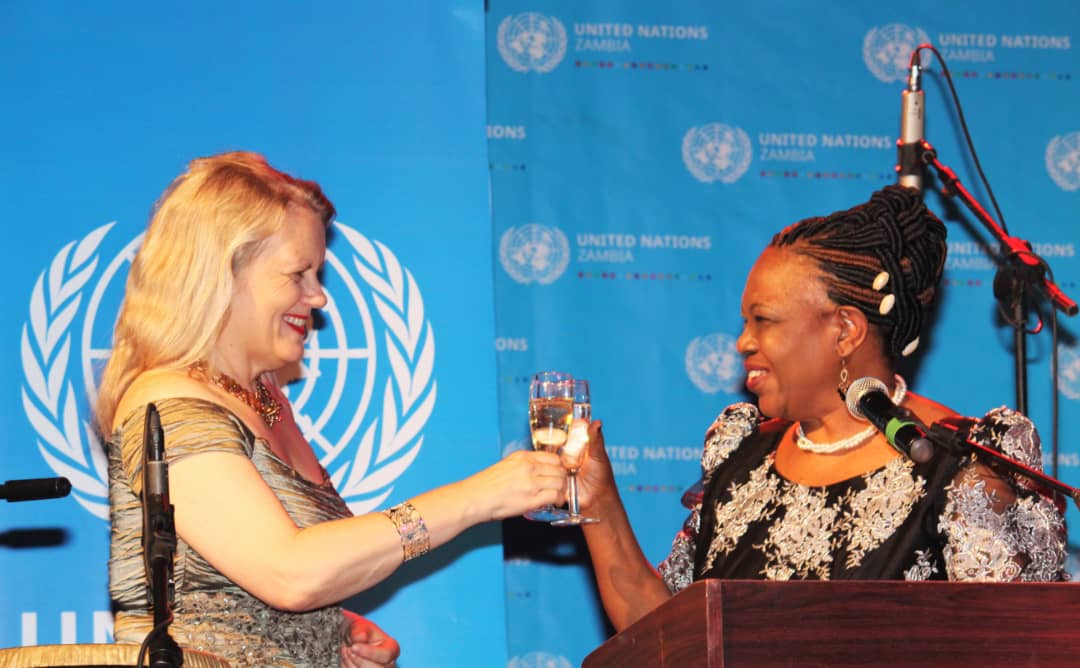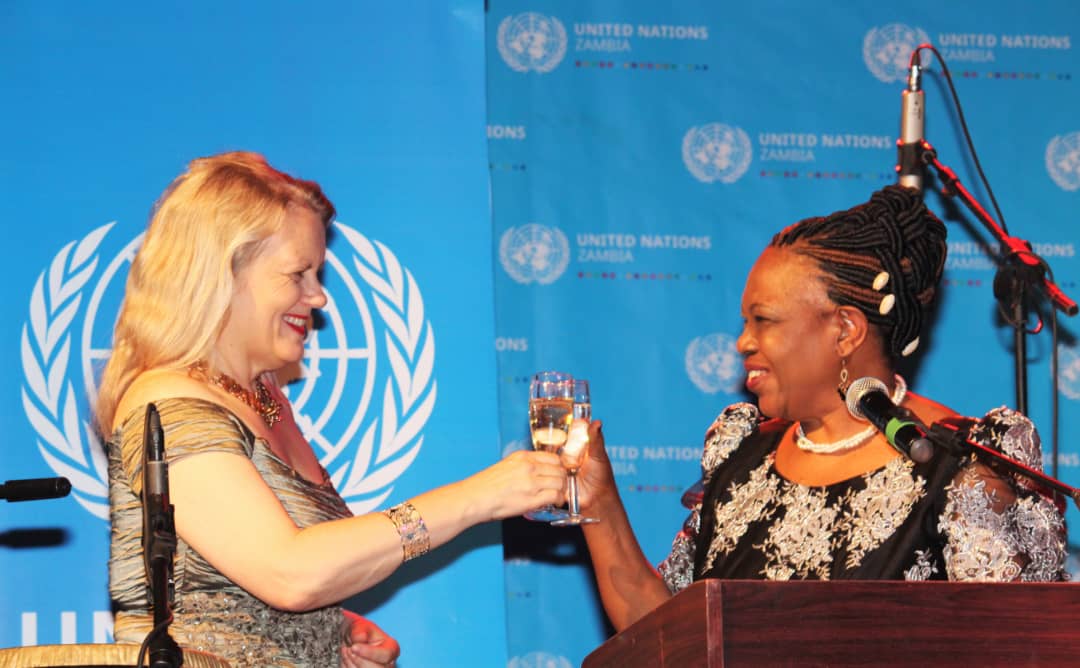Notice: Undefined index: catFilterList in
/home/zambi/public_html/wp-content/plugins/wp-likes/api.php on line
243
Post Views: 1,497

Photo caption: UN Resident Coordinator Janet Rogan and Minister for National Guidance and Religious Affairs Ms. Godfridah Sumaili, MP, make a toast during the UN Day reception held in Lusaka on 31st October 2018. Photo:Jonathan Ngoma/UNCG/2018
Remarks by Ms Janet Rogan, UN Resident Coordinator
at the Reception to celebrate the 73rd Anniversary of the United Nations
Lusaka, Zambia, Wednesday 31 October, 2018
Guest of Honour, Hon Rev Godfridah Sumaili, Minister of Religious Affairs and National Guidance
Honourable Ministers and senior government officials
Your Excellencies, Ambassadors and High Commissioners, and diplomatic staff
Heads of UN Agencies, International Organisations, and their staff
Civil society organisations, faith-based organisations, youth representatives, Private sector,
It is my great honour to welcome you this evening on behalf of the UN Country Team and their staff, and of course myself, to our UN Day Reception. This day is for all of us, citizens of every member state, and those who are observer states, to celebrate the 73rd anniversary of the United Nations.
Around 2000 years ago, a Roman philosopher and emperor (Marcus Aurelius) said:
“When you arise in the morning, think of what a precious privilege it is to be alive – to breathe, to think, to enjoy, to love.”
Imagine how hard it is to feel that precious privilege of living if every morning you wake up in the midst of conflict, not knowing whether you will survive the day; if every morning you wake up in deepest poverty, not knowing where the next meal will come from; if every morning you wake up in a society that discriminates against you because of your gender, sexual orientation, nationality, skin colour, age …
The triple global mission of achieving peace, sustainable development and human rights for each and every person on the planet, leaving no-one behind, was set out in the UN Charter 73 years ago. The UN Charter embodies the hopes, dreams and aspirations of “we the peoples”. Every day, the women and men of the United Nations, guided by the UN Secretary General, Antonio Guterres, work to support Member States and their people to give practical meaning to the Charter. When the Charter was first signed, there were 51 Member States. Today there are 193 members and two observer states.
The first Republican President of Zambia, Dr Kenneth Kaunda, chose UN Day for its Independence Day in 1964, embodying his strong belief in the principles and structures of the United Nations. Zambia has had an exemplary record as a Member State in the 54 years since then. Currently, Zambia is contributing more than 998 women and men to peacekeeping operations around the world. These include police, civilian experts and troops. The largest contingent (930) is serving in MINUSCA in the Central African Republic; while others are in Darfur, South Sudan, DRC and Abyei. Three Zambian peacekeepers gave their lives in Central African Republic and Darfur in 2017 and were posthumously honoured in June 2018 with the Dag Hammerskjold Medal. The United Nations are profoundly grateful for Zambia’s many continuing contributions to the cause of peace. Zambia’s current role as Chair of the Politics, Defence and Security Organ of SADC gives it a special role and responsibility in the International Conference on the Great Lakes Region and the active diplomacy of President Lungu and his government in this respect is commendable.
In terms of development, Agenda 2030 and the 17 Sustainable Development Goals are universal, integrated and indivisible. We cannot pick and choose between them. The bottom line for sustainable development is “Leave No-one Behind”. We can do that only by taking an ambitious multi-sectoral approach, by listening to the people and their priorities, and by being truly inclusive. The UN in Zambia will continue to support the sustainable development priorities of the Zambian people and their government as expressed through the 7th National Development Plan and under our overarching legal framework of the Zambia-United Nations Sustainable Development Partnership Framework (2016-2021). Most UN agencies, funds or specialised agencies are working in Zambia – UNDP, UNICEF, UNFPA, UNAIDS, WHO, UNHCR, ILO, IOM, FAO, WFP, IFAD, UNESCO, UNODC, UNHabitat, UNCTAD, UNIDO, UNECA, UNCDF, UN Volunteers and the IAEA.
Our work includes support for industrialisation and diversification of mining, particularly small-scale mining and development minerals – Zambia was chosen to host the International Artisanal and Small Scale Mining Conference for the Africa Pacific and Caribbean group of countries earlier this year, supported by the EU, because of Zambia’s lead role in this sector. We support agricultural diversification through small livestock programmes, climate-friendly modernised farming and connection to markets. We support diversification of the energy mix to include mini-hydros, solar for health, a safe track for developing civil nuclear power in the longer term. We have supported the concept of Provincial Investment Expos to help find sustainable and prioritised investment from the private sector – following the successful Luapula Expo last year, we supported the Central Province Expo earlier this month and the forthcoming Northern Province Expo. We support the Green Jobs agenda, decent work, and strengthening young people’s voice and effective participation in the implementation of the SDGs in Zambia. We support health systems strengthening; the fight against HIV/AIDS, Malaria and Tuberculosis as well as the newly arising agenda to combat non-communicable diseases such as cardio-vascular issues, diabetes and cancer. We support sexual and reproductive health rights through provision of services, including to the most vulnerable – adolescent girls, and through education in and out of school.
We support improvements to water and sanitation, working at grass roots level in chiefdoms around the country, as well as in emergency situations such as the influx of refugees from DRC who are now safely housed in Mantapala refugee settlement in Luapula province, where we are providing life-saving support and helping them and their host communities to improve their livelihoods and resilience.
We are able to target our work better through our support to the Central Statistics Office and to individual ministries to improve the quality of disaggregated data so that right down to ward level, it is starting to be possible to identify who is being left behind and where they are. And we are supporting the Ministry of National Development Planning to establish quality mechanisms for SDG reporting as well as to bring together all the investment and financing elements required to implement these prioritised plans through a Means of Implementation structure.
We are supporting the governance cluster of the 7th National Development Plan through support for implementation of the recommendations made in the Universal Periodic Review of Zambia’s Human Rights, including support for electoral cycle reform according to mandate. We are developing new programmes to support anti-corruption efforts and to improve access to justice.

Photo caption: UN Resident Coordinator Janet Rogan and Minister for National Guidance and Religious Affairs Ms. Godfridah Sumaili, MP, make a toast during the UN Day reception held in Lusaka on 31st October 2018. Photo:Jonathan Ngoma/UNCG/2018
We thank all of our funding partners for their investment in all these projects and programmes in vital areas of work.
But there is one final area which has been close to my heart throughout my five years in Zambia – the condition of women and girls in Zambia. People have laughed when I use local language to argue against shipikisha and to call for women to break the silence on domestic abuse. And they have wondered how that “muzungu women at the UN” found out about nsunko – the tobacco snuff being abused as a sexual stimulant, particularly by young women. The answer is simple – I find out by asking women about their concerns. And I will always try to speak out for those who have no voice and champion their causes. Earlier this week, I had the honour of participating in the launch in Mongu of the Western Province Fast Track Court for Gender Based Violence Crimes. This is the third such Fast Track Court, after the ones in Central and Lusaka Provinces. Three more will be officially launched soon – in Eastern, Copperbelt and Southern.
The concept of Fast Track Courts for GBV cases is being pioneered in Zambia because the scale of GBV in this country is truly shocking. Since the start of the programme to upgrade the Anti-GBV Act and introduce Fast Track Courts the level of reporting of GBV cases across the country has steadily risen. In 2012, 12,924 crimes were reported; in 2016, that number had risen by 50% to 18,540 – around 50 a day, every day of the year. The increase in reporting shows at least that more people understand that GBV is a crime and more people believe that if they report GBV crimes, there will be action through the judicial system.
While there are increasing numbers of cases of women battering men being reported, it is still overwhelmingly the other way – women and girls are the most victims. Aside from the social and psychological costs of this, the economic cost of the gender gap is staggering. In sub-Saharan Africa alone, it is estimated that the gender gap costs the continent at least USD 95 billion every year. Gender-based violence has no place in the world we want. Great work is being done in this country by HE the President, the government, chiefs and traditional leaders, civil society organisations to promote the HeForShe spirit, to work to end early marriage, to give women equal access to land and other economic goods. But so much more needs to be done by all of us across society to ensure that we make the best use of all the talent, female as well as male, that lives in this country.
From its earliest days, the Republic of Zambia has benefitted from the active participation in public, political and economic life of its women. I would like here to honour and celebrate the memory of Mama Chibesa Kankasa – freedom fighter, politician – who sadly passed on this week. Mama Kankasa has been called a firebrand and a revolutionary. As a youth in her 20s, she played a core role in the independence struggle and in the years of government afterwards. Her husband commented that “a revolution without women’s participation cannot be a reality”. On this UN Day, 73 years after the UN began and 53 years after Zambia’s Independence, I call on the women of Zambia to emulate Mama Chibesa Kankasa, and her fellow freedom fighters, who stood up to build the country they wanted.
It remains only to propose a toast to the health of His Excellency the President of the Republic of Zambia, Mr Edgar Chagwa Lungu; to the women and men of Zambia; and to Leaving No-one Behind.
Photo caption: UN Resident Coordinator Janet Rogan and Minister for National Guidance and Religious Affairs Ms. Godfridah Sumaili, MP, make a toast during the UN Day reception held in Lusaka on 31st October 2018. Photo:Jonathan Ngoma/UNCG/2018
 Be the first to like.
Be the first to like.























